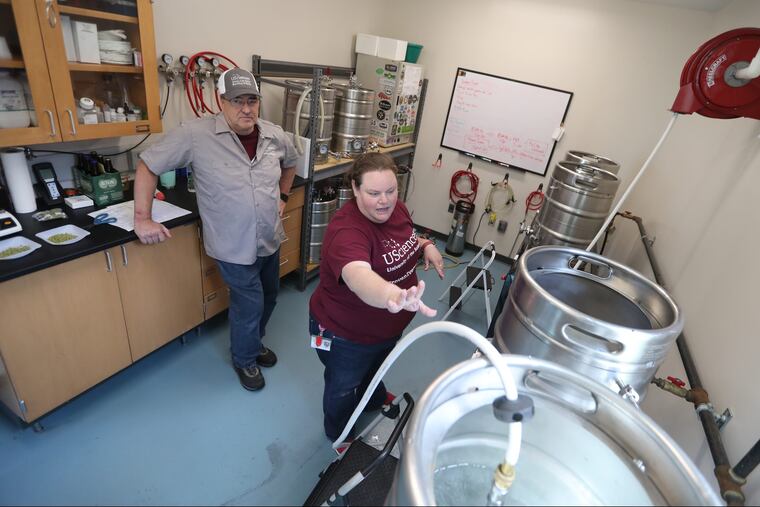Want to break into Philly’s booming craft beer scene? Study up.
This USciences beer certificate features night classes and can be done in a year or two.

Imagine a brewery that doubles as a lab. There are huge vats like those behind glass panes at Iron Hill, or the tanks behind the bar at Victory Brewing Co. And there are also Erlenmeyer flasks, the conical kind common in labs, instead of hip flasks for discreet swigging. Chemical formulas stick to the fridge with a Dock Street sticker.
That's the scene at the University of the Sciences' pilot brewing lab, where Matthew Farber drinks from a monogrammed glass advertising his program to sample the brewery's latest concoction. This sour beer is made from a wild yeast that shortens brewing times for the popular drink — a key factor in costs — and was discovered on a tree near campus in West Philadelphia.
Farber directs the University of the Sciences brewing science program, the first graduate certificate in the brewing industry offered in the Northeast when it started three years ago; Nationally, the University of California, Davis and Colorado State University offer four-year programs. An additional 14 schools offer a certificate program accredited by the Brewers Association. And Pennsylvania College of Technology offers an associate's degree in brewing and fermentation science in Williamsport.
Farber leads a tour of the lab sporting a monogrammed Brewing Science cap and polo. He calls himself an "academic brewer," and his office is filled in equal parts with chemistry books and bottle openers. On the wall in the faculty hallway is a summary for a recent patent application describing a molecular process that identifies a contaminant bacterial strain in brews. The program also has a patent pending for the wild yeast for sour beer.
Established in 2015 after Farber presented some "sound business arguments" to some skeptical administrators, the program has graduated 16 students as certified brewing scientists — with seven more in the pipeline. All have found work in breweries, including such stalwarts here as Victory, Conshohocken Brewing Co., Vault, and Cape May Brewing Co.
The program gives Farber a good perspective on new micro beer trends. One such development is the rise of a new style, the hazy New England India Pale Ale, a cloudy brew flavored with citrus and floral hops. This type requires less equipment to make than a clear IPA, and has attracted attention from big-time brewers like Samuel Adams, which released a New England IPA in February.
Another trend is mobile canning, where beer is put into cans at a community event or anywhere outside the tap room. The practice is growing more popular, as consumers demand more canned beer instead of bottled, But quality can suffer, he notes, and problems can arise — as they do in any canning operation, mobile or not — such as oxygen and microbial contamination, which can expedite flavors that cause staleness or trigger a refermentation.
The region is a fertile one for beer making. The Brewers Association lists Pennsylvania as having the sixth most craft breweries, with 282 as of 2017, up from 205 in 2016. In Philadelphia, there are 30 full or associate members of the Independent Craft Brewing Association.
The program that Farber created when he was a postdoc is "designed for a working professional," with classes held at night. There are two options — a more accelerated one-year program or a two-year version — and tuition is the same for both, $1,182 per credit, for a total of about $21,276 for the current school year.
The USciences program doesn't have a commercial license, and Farber says one doesn't look to be in the cards. It's a training facility, and it doesn't make sense to compete with the region's resurgent industry.
Marisa Egan, the newly hired brewing manager for the program's pilot lab, came to the program from Victory in Downingtown, where she was a brewery chemist working in quality. Egan is heading one of the seven academic classes in the program: Projects in Brewing.
For the first year, the class focused on lab tests in which students played with one variable in the fermentation and production process. It has since been updated.
One team is now in the planning phase of an actual can release. Farber says the objective is to "partner with a brewery to collaborate on a beer of the student's design." Students work in teams to create and pitch the beer. A team of students comprised of Dave MacKenzie, Josh Johnson, Ray Cavalieri, and Sean Naughton is working with Levante Brewery in West Chester on a can release that is expected this summer.
Alumnus Dave Goldman, owner of Urban Village Brewing Co. in Northern Liberties, had been a home brewer for a while. After founding the Landmark Americana restaurant on the Drexel campus and expanding to four locations, Goldman set his sights on craft brewing, and developed a business plan for what would become Urban Village.
He graduated from the program in December 2016 and opened Urban Village in June 2017. He says the competencies taught in the brewing science program made it so there "wasn't so much a learning curve when opening up Urban Village."
He recalls starting off with a "great intro into the history of brewing" and doing lab-grade science like "DNA sequencing, the sort of things that you would never gain access to unless you were in a lab."
Urban Village, he says, is growing. The brewery is at capacity, and is "looking into a second pub with a bigger brewery so that we can meet the demand for distribution."
Goldman identifies academic brewing as a "major need for the industry. There's so many people making beer in small breweries now that I don't believe have a handle on all of the science involved. And it's not necessary to make good beer per se, but if you want to make good beer consistently, it's critical."